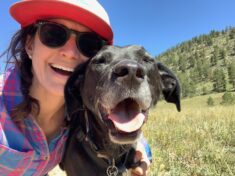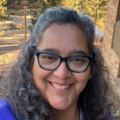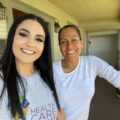
Growing up, and for much of my life, I internalized the belief that to think only of others, acting out of selflessness, was the key to a meaningful life. All around me, I saw that those viewed as most worthy in our society were often celebrated for how much they served other people, even though it was at a personal cost to themselves. This impacted how I saw myself and my own role as a young person trying to find my way professionally.
Starting in high school and all through my twenties, I had many community-serving jobs that aligned with what I had internalized I was supposed to do but that I quite frankly never liked and came at real cost to my happiness. I have distinct memories of realizing this two decades ago when I worked part-time at a nonprofit teen outreach center in Upstate New York and resigned myself to accept that I had no other choice. I felt guilty for not wanting to pick up extra shifts to help kids with their homework or make meals. I still felt guilty several jobs later when I would cry every morning in my office because I was so unhappy at work, while the rest of my coworkers talked about how gratifying it was to be at our organization.
I was miserable and unfulfilled doing day-to-day work that did not align with my strengths or personality, and I barely ever made a living wage. It was at the expense of my own well-being and health. I struggled to reconcile my values and my actual experience working in these types of jobs; if I cared about other people and fighting injustice, then this seemed like my only option. Although it took many years of grappling with these feelings and navigating environments that had taken a toll on my wellbeing, my experiences building collective power with Center for Health Progress has shifted my beliefs . I have come to understand that I want to live my values by organizing out of what we call “self-interest.”
Why we must be driven by self-interest
Self-interest comes from the Latin “Inter-ess” or “Among – to be.” It is about being myself in relation to others; being clear about who I am and what I want, and being in relationship with others who are clear about who they are and what we want. Most people in power in our society (think CEOs and elected officials) are building power for their values, not mine. It is all about what is in it for them, and often, their self-interest is at my expense. I want more people in power who share my values. I know that when we create change that’s driven by our self-interest, our movement building is more sustainable, we are less likely to experience burnout, and it can prevent a “savior” dynamic.
One example that helped me understand self-interest is thinking about private health insurance. My self-interest in having health insurance is to get all the quality health care I need. The self-interest of a health insurance company is to make as much money as possible for themselves and shareholders. Our values and self-interests do not align. I want a health care system that exists to protect my health, not to deny as many claims as possible to keep more money in their pockets.
My teammate, Yesenia, and I just wrapped up training our new leaders on this concept of self-interest, building off our foundational training on why we need to claim our power and build power with others, In Pueblo, Fort Morgan, and Denver, Yesenia and I supported dozens of our leaders in exploring what felt uncomfortable and challenging about declaring that we want to transform the health care system not just for our communities but for ourselves too. We explored why it was so difficult to ask, what’s in it for me? At each training, we saw our leaders–particularly those who are women, People of Color, and/or immigrants–affirm that acting out of self-interest was incredibly difficult, and counter to what they had been taught throughout their lives.
In all of our leader trainings, our staff models what it looks like to unpack internalized beliefs and lean into discomfort, and we’re transparent about the things we’re still working on. The first time I took this training myself, I read a list of how people act selflessly. It was basically a check-list of how I spent a lot of my time and energy with others, and this really helped me understand why I need to free myself of these patterns to build power.
Here are some things from the list:
- People pleaser
- Avoid asserting their ideas, minimizing what they have to contribute
- Cause other people to take responsibility for me, my decisions.
- Burnout, depression, exhaustion, anxiety, mental health, shingles
- Asking for permission all the time
- Apologizing all the time
- Fear of making mistakes; perfectionism
- Feeling like a victim; Others have all the power.
- Playing small; not saying what I think or taking on responsibility that I want
- Feeling inferior to others
I have known many of these behaviors–like constantly saying sorry for almost anything I did or not speaking up out of my own fear of making mistakes–were not aligned with how I wanted to be in community with others. I have been working on many of these things for years and more recently, our staff started pushing each other to transform these behaviors. It’s an ongoing journey for me to re-learn and reclaim my time, energy, and relationships.
When we brought this training to our leaders, I shared some deeply meaningful moments with folx who spoke about how their whole identity is wrapped up in being a selfless person. Other leaders said they feel guilty for making decisions that are about their own well-being and success. I saw a lot of “light bulb moments” when we shared how the corporate and political elites in our society promote selflessness as a way to keep the rest of us powerless and from taking risks to make our lives better.
Another future is possible
We end our training with an activity to get us all to reflect on and declare our self-interest. We ask, Why, of all the things that we could be doing, do we choose to build power at Center for Health Progress in order to transform our health care system? What do we want to get out of it for ourselves? We push folx to think about not only their families, their communities, their patients, and people they do not know, but to also think about themselves. We are all part of the community and all deserve to declare that we want things to be different for ourselves, too.
In deepening my own analysis around health care and power in our society, I’ve come to understand that I both deserve the health care I need, and get to demand better from our healthcare system. As a white, middle class, educated person who has almost always had private health insurance, I do not experience the level of systemic barriers and harm many others face. And my reality is that access to affordable health insurance is still contingent on my employment, I pay thousands of dollars each year for care that my insurer does not cover, and the private health insurance company prioritizes profit over my health.
I can fight for and demand better. I have a self-interest in being part of Center for Health Progress because building power with others who hold my values gives me hope that another future is possible, where I am valued for who I am. I deserve to have the right to make decisions about my life and my health care, and I deserve a system that values my humanity over profit.




